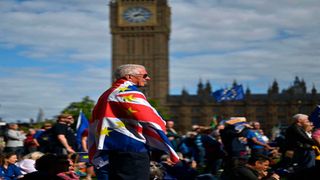
A protester wearing as a cape a modified Union Jack flag with stars like the EU flag stands in the crowds after marching from Hyde Park to Palace of Westminster in central London during a rally calling for the UK to rejoin the EU on September 23, 2023.
| Courtesy | AFPOur Columnists
Premium
UK protests: Demonstration fever grips an angry country
Scarcely a day seems to pass nowadays without police on the streets trying to control unruly mobs demonstrating for a cause or simply causing mayhem.
The Gaza crisis brought thousands onto the streets of several cities in support of the Palestinians, many of them angered by Home Secretary Suella Braverman’s description of their protests as “hate marches”.
Speaking after a high-level national security meeting, Ms Braverman said, “We’ve seen tens of thousands of people take to the street after the massacre of Jewish people, the single largest loss of life since the Holocaust, chanting for the erasure of Israel from the map.
“To my mind, there is only one way to describe those marches, they are hate marches.”
Sir Mark Rowley, the UK’s most senior police officer, said there had been a 14-fold increase in anti-semitism in London and a threefold rise against Muslims.
Ms Braverman warned that protestors would be locked up instantly if they tried to demonstrate at the Cenotaph to Britain’s war dead in London on Remembrance Weekend yesterday and today.
An environmental group, Just Stop Oil, is now a regular protestor, its latest action being an attack on a famous painting at the National Gallery in London. Two activists were arrested after smashing glass protecting Diego Velasquez’s famous painting, the Rokeby Venus.
The two young people who smashed the glass with safety hammers waited to be arrested.
A spokesman for the group said, “New oil and gas will kill millions. If we love art, we love life, if we love our families, we must just stop oil.”
At the same time, some 100 Just Stop Oil protestors were arrested after slow-marching and causing traffic jams in central London.
Political causes apart, some of the recent chaos, often with an anti-official bias, flared in Bonfire Night clashes, particularly in Scotland.
Bonfires are lit across the UK every November 5 to commemorate the failed attempt by Guy Fawkes and his fellow conspirators to blow up Parliament and the ruling King James I in 1605.
Recently, boys and men have attacked fire crews and policemen, eight of whom were injured in organised clashes in Scotland.
The most serious disorder took place in the Niddrie area of Edinburgh, where a group of 50 youths threw fireworks and petrol bombs at police.
A spokesman said officers had faced “unprecedented levels of violence”, including adults caught on camera directing children to commit crimes.
The Scottish Fire and Rescue Service said there were nine attacks on its crews during an eight-hour period on Bonfire Night.
It is difficult to find a light side to this mass misbehaviour but there’s usually a joker in the pile. In this case, an official-looking road traffic sign pointing to Parliament and saying, “Gunpowder deliveries.”
* * *
It’s not an advertisement I ever expected to see, but there it was, a quarter-page in a national newspaper, headed “Secret Intelligence Service” and offering jobs as spies.
“We are MI6, known as the Secret Intelligence Service,” the ad said. “We work secretly around the world gathering intelligence to promote and protect Britain’s interests and stay ahead of our adversaries.”
After outlining requirements – five to 10 years of corporate experience, keen to live abroad, enjoy working with others – the recruiters warned, “Please do not disclose to anyone that you have contacted MI6.”
And here I thought Britain’s top spies all came from Cambridge University – Kim Philby, Donald Maclean, Guy Burgess and Anthony Blunt.
* * *
It’s relaxing occasionally to detach from the great whirlpool of world politics and consider more modest eddies of everyday life, like why do people wear their baseball caps backwards?
The question arose in the Metro newspaper when a reader declared the practice stemmed from prison visits in America – a backwards cap allowed a person to sit closer to the glass when visiting an inmate.
Another contributor said the practice stemmed from baseball catchers who switched their caps around because the peaks interfered with their face masks.
The advantage of the peak at the back was widely seen as protection of the wearer’s neck from the sun -– admittedly thus leaving the eyes vulnerable to its rays.
Perhaps the best approach came from a certain HG from Maidstone. He used to play a trick on people with caps on backwards by asking where they bought their caps because the only ones he could find had peaks at the front.
“The looks some of them gave me were priceless,” he said.
* * *
Exercise is supposed to prolong your life but not everyone is convinced.
A newspaper reader pointed out that rabbits, which spend lots of their time running and jumping, live for only two years, while turtles, which never exercise, can live to 200 years.





